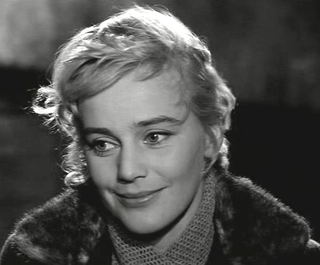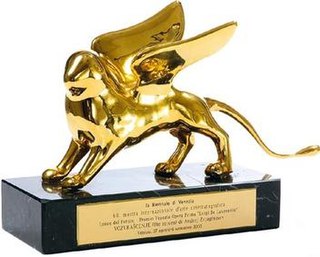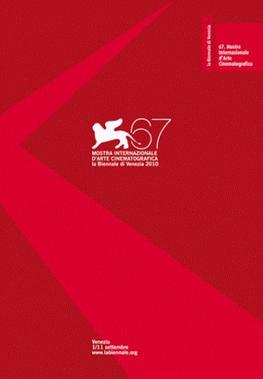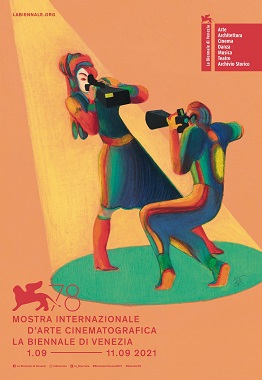Related Research Articles

The Venice Film Festival or Venice International Film Festival is an annual film festival held in Venice, Italy. It is the world's oldest film festival and one of the "Big Five" International film festivals worldwide, which include the Big Three European Film Festivals, alongside the Toronto International Film Festival in Canada and the Sundance Film Festival in the United States. These festivals are internationally renowned for giving creators the artistic freedom to express themselves through film. In 1951, FIAPF formally accredited the festival.

Maria Margarethe Anna Schell was an Austrian-Swiss actress. She was one of the leading stars of German cinema in the 1950s and 1960s. In 1954, she was awarded the Cannes Best Actress Award for her performance in Helmut Käutner's war drama The Last Bridge, and in 1956, she won the Volpi Cup for Best Actress at the Venice Film Festival for Gervaise.

The Golden Lion is the highest prize given to a film at the Venice Film Festival. The prize was introduced in 1949 by the organizing committee and is now regarded as one of the film industry's most prestigious and distinguished prizes. In 1970, a second Golden Lion was introduced; this is an honorary award for people who have made an important contribution to cinema.

Gervaise is a 1956 French historical drama film directed by René Clément based on the 1877 novel L'Assommoir by Émile Zola. It depicts a working-class woman in the mid-nineteenth century trying to cope with the descent of her husband into alcoholism.
Main Street is a 1956 Spanish drama film directed by Juan Antonio Bardem starring Betsy Blair and José Suárez. It is based on a Carlos Arniches play titled La señorita de Trévelez. The shooting locations were Palencia, Cuenca and Logroño. The film won the FIPRESCI Award at the Venice Film Festival. It was also selected as the Spanish entry for the Best Foreign Language Film at the 30th Academy Awards, but was not accepted as a nominee.

The Captain from Köpenick is a 1956 West German comedy film directed by Helmut Käutner and based upon the 1931 play The Captain of Köpenick by Carl Zuckmayer. The play was based on the true story of Wilhelm Voigt, a German impostor who masqueraded as a Prussian military officer in 1906 and became famous as the Captain from Köpenick. It was nominated for the 29th Academy Awards in the category Best Foreign Language Film.
Nunca pasa nada is a 1963 Spanish-French drama film directed by Juan Antonio Bardem. Starring a mixed cast of French and Spanish actors it was shot both in Spanish and French. It was a commercial flop at the time of its release.

The 61st annual Venice International Film Festival was the 2004 edition of the Venice International Film Festival, held between 1 and 11 September 2004. The festival opened with Steven Spielberg's The Terminal, and closed with Katsuhiro Otomo's Steamboy. The Golden Lion was awarded to Vera Drake, directed by Mike Leigh.

The 6th annual Venice International Film Festival was held between 8 and 31 August 1938. The festival screened a French cinema retrospective, spanning works from 1891 to 1933.

The 67th annual Venice International Film Festival held in Venice, Italy, took place from 1 to 11 September 2010. American film director and screenwriter Quentin Tarantino was the head of the Jury. The opening film of the festival was Darren Aronofsky's Black Swan, and the closing film was Julie Taymor's The Tempest. John Woo was awarded the Golden Lion for Lifetime Achievement prior to the start of the Festival.

The 51st annual Venice International Film Festival was held on 1 September to 12 September, 1994.

The 50th annual Venice International Film Festival was held on 31 August to 11 September 1993.

The 69th annual Venice International Film Festival, organized by Venice Biennale, took place at Venice Lido from 29 August to 8 September 2012. The festival opened with the Indian director Mira Nair's The Reluctant Fundamentalist, and closed with the Out of Competition film The Man Who Laughs, directed by Jean-Pierre Ameris. Terrence Malick's film To the Wonder was met with both boos and cheers from critics at its premiere.

The 42nd annual Venice International Film Festival was held on 26 August to 6 September 1985.

The 70th annual Venice International Film Festival took place in Venice, Italy from 28 August to 7 September 2013. American film director William Friedkin was presented with a lifetime achievement award. Italian film director Bernardo Bertolucci was the president of the jury. He was previously the president of the jury at the 40th edition in 1983. Gravity, directed by Alfonso Cuarón, was the opening film of the festival. Italian actress Eva Riccobono hosted the opening and closing nights of the festival.
The 19th annual Venice International Film Festival was held from 24 August to 7 September 1958.

The 74th annual Venice International Film Festival was held from 30 August to 9 September 2017.

The 77th annual Venice International Film Festival was held from 2 to 12 September 2020, albeit in a "more restrained format" due to the COVID-19 pandemic.

The 78th annual Venice International Film Festival was held from 1 to 11 September 2021.

The 79th annual Venice International Film Festival was held from 31 August to 10 September 2022. Noah Baumbach's White Noise was the festival's opening film, and Francesco Carrozzini's The Hanging Sun was the closing film.
References
- ↑ "The 1950s[sic]" . Retrieved October 8, 2013.
- ↑ Roos, Fred (Spring 1957). "Venice Film Festival, 1956" (PDF). The Quarterly of Film Radio and Television. 11 (3). University of California Press: 249. doi:10.2307/1209744. JSTOR 1209744 . Retrieved April 5, 2020.
The report began with a few sentences of praise for each of the 14 films[ sic ], and then selected the Japanese Harp of Burma and the Spanish Calle Mayor as being particularly outstanding. Since the jury was unable to decide which of these two films was the superior, it had decided not to award a grand prix "St. Mark Golden Lion" this year.
[ permanent dead link ] - ↑ "17. Mostra Internazionale d'Arte Cinematografica di Venezia". La Biennale di Venezia (in Italian). Archivio Storico delle Arti Contemporanee. Retrieved April 23, 2020.
- ↑ "Juries for the 1950s[sic]" . Retrieved October 8, 2013.